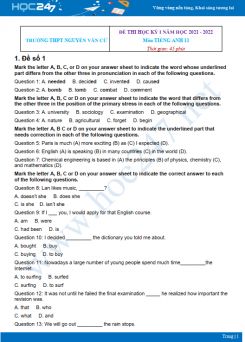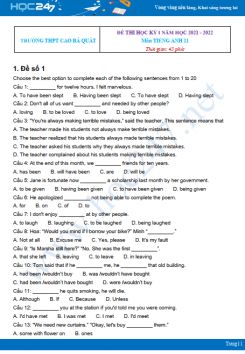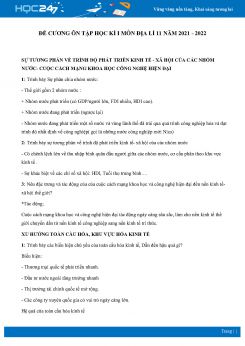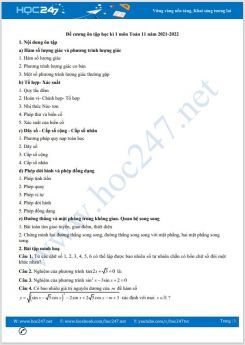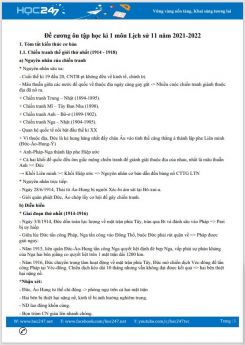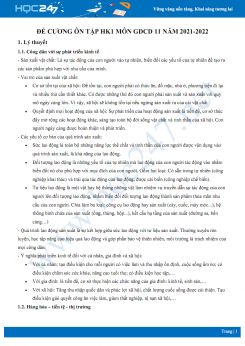Qua nß╗Öi dung t├Āi liß╗ću ─Éß╗ü cŲ░ŲĪng ├┤n tß║Łp hß╗Źc k├¼ 1 m├┤n Tiß║┐ng Anh 11 n─ām 2021-2022 gi├║p c├Īc em hß╗Źc sinh lß╗øp 11 ├┤n tß║Łp tß╗æt nß╗Öi dung ─æ├Ż hß╗Źc v├Ā thß╗▒c h├Ānh c├Īc dß║Īng b├Āi tß║Łp ─æß╗ā chuß║®n bß╗ŗ cho k├¼ thi HK1 sß║»p ─æß║┐n ─æŲ░ß╗Żc HOC247 bi├¬n soß║Īn v├Ā tß╗Ģng hß╗Żp ─æß║¦y ─æß╗¦. Hi vß╗Źng t├Āi liß╗ću sß║Į c├│ ├Łch vß╗øi c├Īc em.
Ch├║c c├Īc em c├│ kß║┐t quß║Ż hß╗Źc tß║Łp tß╗æt!
─Éß╗Ć CŲ»ŲĀNG ├öN Tß║¼P Hß╗īC K├ī 1 M├öN TIß║ŠNG ANH 11 N─éM 2021-2022
1. Nß╗Öi dung l├Į thuyß║┐t
MODAL VERBS: SHOULD & OUGHT TO; MUST & HAVE TO (─Éß╗Öng tß╗½ khuyß║┐t thiß║┐u: n├¬n; phß║Żi)
1.1. MUST & HAVE TO
1.1.1. Must
- Diß╗ģn ─æß║Īt sß╗▒ cß║¦n thiß║┐t hoß║Ęc bß║»t buß╗Öc phß║Żi l├Ām ─æiß╗üu g├¼ ß╗¤ hiß╗ćn tß║Īi hoß║Ęc tŲ░ŲĪng lai.
Eg: You must get up earlier in the morning.
(Buß╗Ģi s├Īng con phß║Żi dß║Ły sß╗øm hŲĪn ─æß║źy.)
- ─ÉŲ░a ra lß╗Øi suy luß║Łn chß║»c chß║»n.
Eg: You must be hungry after a long walk.
(Hß║│n l├Ā bß║Īn phß║Żi ─æ├│i buujng sau chuyß║┐n ─æi bß╗Ö d├Āi.)
- ─ÉŲ░a ra lß╗Øi khuy├¬n hoß║Ęc lß╗Øi y├¬u cß║¦u ─æŲ░ß╗Żc nhß║źn mß║Īnh.
Eg: You must be here before 8 oŌĆÖclock tomorrow.
(S├Īng mai, anh phß║Żi c├│ mß║Ęt tß║Īi ─æ├óy trŲ░ß╗øc 8 giß╗Ø.)
1.1.2. Have to
Cß║Ż must v├Ā have to ─æß╗üu d├╣ng ─æß╗ā diß╗ģn ─æß║Īt sß╗▒ cß║¦n thiß║┐t phß║Żi l├Ām ─æiß╗üu g├¼ ─æ├│.
Tuy nhi├¬n, c├│ sß╗▒ kh├Īc nhau.
- Must: sß╗▒ bß║»t buß╗Öc ─æß║┐n tß╗½ ph├Ła ngŲ░ß╗Øi n├│i (l├Ā mong muß╗æn v├Ā cß║Żm x├║c cß╗¦a ngŲ░ß╗Øi n├│i.)
- Have to: sß╗▒ bß║»t buß╗Öc do t├¼nh thß║┐ hoß║Ęc ─æiß╗üu kiß╗ćn b├¬n ngo├Āi (nß╗Öi quy, luß║Łt ph├Īp, quy ─æß╗ŗnh ..)
I really must stop smoking. I want to do (T├┤i phß║Żi bß╗Å thuß╗æc l├Ī. V├¼ t├┤i muß╗æn thß║┐.)
I have to stop smoking. DoctorŌĆÖs order. (T├┤ phß║Żi bß╗Å h├║t thuß╗æc. Lß╗ćnh cß╗¦a b├Īc sß╗╣ ─æß║źy.)
- MustnŌĆÖt: kh├┤ng ─æŲ░ß╗Żc ph├®p (chß╗ē sß╗▒ cß║źm ─æo├Īn)
- DonŌĆÖt have to = donŌĆÖt need to (kh├┤ng cß║¦n thiß║┐t)
Eg: You mustnŌĆÖt wear bare feet in this lab.
(Bß║Īn kh├┤ng ─æŲ░ß╗Żc ph├®p ─æi ch├ón kh├┤ng v├Āo ph├▓ng th├Ł nghiß╗ćm.)
You donŌĆÖt have to wash those glasses. They are clean.
(Kh├┤ng cß║¦n rß╗Ła nhß╗»ng c├Īi k├Łnh ─æ├│ ─æ├óu. Ch├║ng sß║Īch m├Ā.)
1.1.3. SHOULD & OUGHT TO
- Should
- Chß╗ē sß╗▒ bß║»t buß╗Öc hay bß╗Ģn phß║Łn, nhŲ░ng kh├┤ng mß║Īnh bß║▒ng Must (vß╗øi Should bß║Īn c├│ thß╗ā lß╗▒a chß╗Źn viß╗ćc thß╗▒c hiß╗ćn hay kh├┤ng thß╗▒c hiß╗ćn, c├▓n must th├¼ kh├┤ng c├│ sß╗▒ chß╗Źn lß╗▒a.)
Eg: Applications should be sent before December 8th .
(─ÉŲĪn xin viß╗ćc phß║Żi ─æŲ░ß╗Żc gß╗Łi ─æß║┐n trŲ░ß╗øc ng├Āy 8 th├Īng 12.)
- ─ÉŲ░a ra lß╗Øi khuy├¬n hoß║Ęc ├Į kiß║┐n.
Eg: You shouldnŌĆÖt drive so fast. ItŌĆÖs very dangerous.
- Suy ─æo├Īn hoß║Ęc kß║┐t luß║Łn ─æiß╗üu g├¼ ─æ├│ c├│ thß╗ā xß║Ży ra (ngŲ░ß╗Øi n├│i mong ─æß╗Żi ─æiß╗üu g├¼ ─æ├│ xß║Ży ra.)
Eg: Anna has been studying hard for the exam, so she should pass.
(Anna ─æ├Ż hß╗Źc h├Ānh rß║źt ch─ām chß╗ē. Chß║»c c├┤ ß║źy sß║Į thi ─æß║Łu th├┤i.)
- Ought to
- Chß╗ē sß╗▒ bß║»t buß╗Öc hay bß╗Ģn phß║Łn . Ngh─®a tŲ░ŲĪng tß╗▒ nhŲ░ should v├Ā kh├┤ng mß║Īnh bß║▒ng Must.
Eg: You ought not to eat sweets at nights.
(Con kh├┤ng ─æŲ░ß╗Żc ─ān kß║╣o v├Āo buß╗Ģi tß╗æi nh├®.)
- ─ÉŲ░a ra lß╗Øi khuy├¬n hoß║Ęc kiß║┐n nghß╗ŗ.
Eg: There ought to be traffic lights at this crossroads.
(N├¬n c├│ ─æ├©n giao th├┤ng tß║Īi ng├Ż tŲ░ n├Āy.)
1.2. LINKING VERBS: be, seem, verbs of perception
ŌĆ£Linking verbŌĆØ d├╣ng khi nß╗æi chß╗¦ ngß╗» v├Ā vß╗ŗ ngß╗» (vß╗ŗ ngß╗» l├Ā mß╗Öt t├Łnh tß╗½) ─æß╗ā chß╗ē t├¼nh trß║Īng cß╗¦a ─æß╗ō vß║Łt, ngŲ░ß╗Øi hay sß╗▒ viß╗ćc n├Āo ─æ├│.
C├│ mß╗Öt nh├│m c├Īc ─æß╗Öng tß╗½ ─æß║Ęc biß╗ćt c├│ chß╗®c n─āng nß╗æi giß╗»a chß╗¦ ngß╗» v├Ā vß╗ŗ ngß╗» t├Łnh tß╗½. Kh├┤ng giß╗æng c├Īc ─æß╗Öng tß╗½ kh├Īc, ch├║ng kh├┤ng thß╗ā hiß╗ćn h├Ānh ─æß╗Öng. Do vß║Ły ch├║ng ─æŲ░ß╗Żc bß╗Ģ ngh─®a bß╗¤i t├Łnh tß╗½ chß╗® kh├┤ng phß║Żi ph├│ tß╗½. NgŲ░ß╗Øi ta gß╗Źi ch├║ng l├Ā li├¬n ─æß╗Öng tß╗½ (linking verb). ─É├│ l├Ā nhß╗»ng ─æß╗Öng tß╗½ ß╗¤ bß║Żng sau:
|
be |
become |
remain |
stay |
Eg: Mary feels bad about her test grade.
(Mary thß║źy ├Īy n├Īy vß╗ü ─æiß╗ām cß╗¦a b├Āi kiß╗ām tra.)
Ch├║ ├Į: feel, look, smell v├Ā taste c┼®ng c├│ thß╗ā l├Ā ngoß║Īi ─æß╗Öng tß╗½ khi n├│ c├│ t├ón ngß╗» trß╗▒C tiß║┐p. Trong trŲ░ß╗Øng hß╗Żp ─æ├│, n├│ trß╗¤ th├Ānh mß╗Öt ─æß╗Öng tß╗½ m├┤ tß║Ż h├Ānh ─æß╗Öng thß╗▒c sß╗▒ chß╗® kh├┤ng c├▓n l├Ā mß╗Öt hß╗ć tß╗½ (linking verb) v├Ā do ─æ├│ n├│ ─æŲ░ß╗Żc bß╗Ģ ngh─®a bß╗¤i ph├│ tß╗½ chß╗® kh├┤ng phß║Żi t├Łnh tß╗½. Ch├║ng ─æŲ░ß╗Żc ph├®p chia ß╗¤ th├¼ tiß║┐p diß╗ģn.
Eg: The doctor felt the leg carefully to see if there were any broken bones.
(Vß╗ŗ b├Īc s─® sß╗Ø nß║»n ch├ón mß╗Öt c├Īch cß║®n thß║Łn ─æß╗ā xem c├│ c├▓n c├Īi xŲ░ŲĪng g├Ży n├Āo nß╗»a kh├┤ng.)
1.3. CLEFT SENTENCES: It is/ wasŌĆ”thatŌĆ”
1.3.1. ─Éß╗ŗnh ngh─®a c├óu chß║╗.
C├óu chß║╗ hay c├▓n gß╗Źi l├Ā c├óu nhß║źn mß║Īnh (Cleft sentences ) theo ─æ├║ng nhŲ░ t├¬n gß╗Źi cß╗¦a n├│, d├╣ng ─æß╗ā khi ta muß╗æn nhß║źn mß║Īnh v├Āo mß╗Öt ─æß╗æi tŲ░ß╗Żng hay sß╗▒ viß╗ćc n├Āo ─æ├│. C├óu thŲ░ß╗Øng chia l├Ām hai vß║┐, mß╗Öt vß║┐ ch├Łnh v├Ā mß╗Öt vß║┐ l├Ā mß╗ćnh ─æß╗ü quan hß╗ć sß╗Ł dß╗źng that, who, when, whileŌĆ”
1.3.2. Cß║źu tr├║c c├óu chß║╗ : It + be + ŌĆ”. that + ŌĆ”
1.3.3. Ph├ón loß║Īi c├óu chß║╗ :
Ta c├│ thß╗ā nhß║źn mß║Īnh chß╗¦ ngß╗», t├ón ngß╗», trß║Īng ngß╗» cß╗¦a c├óu bß║▒ng c├Īch ─æŲ░a ch├║ng v├Āo giß╗»a It be v├Ā that
- C├óu chß║╗ nhß║źn mß║Īnh chß╗¦ ngß╗»
* It is/was + S (ngŲ░ß╗Øi) + who/that + V
* It is/was + S (vß║Łt) + that + V
Eg : Mr. Hung teaches English at my school.
=> It is Mr Hung who/that teaches English at my school
My dog made neighbors very scared.
=> It was my dog that made neighbors very scared
- C├óu chß║╗ nhß║źn mß║Īnh t├ón ngß╗»
* It is/was + O (ngŲ░ß╗Øi) + that/whom + S + V
* It is/was + O (danh từ riêng) + that + S + V
* It is/was +O (vß║Łt)+ that + S + V.
EX1 : He gave his wife the whole confidential document.
=> It was his wife that/whom he gave the whole confidential document.
1.4. TO ŌĆō INFINITIVES AFTER NOUNS/ ADJECTIVES (To ŌĆō V sau danh tß╗½/ t├Łnh tß╗½)
1. Ch├║ng ta c├│ thß╗ā sß╗Ł dß╗źng To ŌĆō V ─æß╗®ng sau t├Łnh tß╗½ ─æß╗ā ─æŲ░a ra l├Į do cho t├Łnh tß╗½ ─æ├│.
S + linking verb + adjectives + to ŌĆō V
Linking verb: be, appear, feel, become, seem, look, remain, sound, smell, stay, taste
Adjectives: glad, happy, lucky, amazed, surprised, proud, determined, pleased, sorry, disappointed, sad, afraid
Eg: I am happy to see my former teacher again.
(T├┤i rß║źt vui khi gß║Ęp lß║Īi gi├Īo vi├¬n c┼®.)
2. Ch├║ng ta c├│ thß╗ā sß╗Ł dß╗źng To ŌĆō V trong cß║źu tr├║c vß╗øi ŌĆ£ItŌĆØ v├Ā t├Łnh tß╗½ ─æß╗ā ─æŲ░a ra lß╗Øi nhß║Łn x├®t hoß║Ęc ─æ├Īnh gi├Ī.
It + linking verb + adjectives (for somebody) + to ŌĆō V
Adjectives: easy, difficult, hard, interesting, boring, nice, great, good, possible, impossible , likely, important, necessary, unreasonable.
Eg: It is interesting to talk to him.
(Thß║Łt th├║ vß╗ŗ ─æß╗ā n├│i chuyß╗ćn vß╗øi anh ß║źy.)
3. Ch├║ng ta c├│ thß╗ā sß╗Ł dß╗źng To ŌĆō V sau nhß╗»ng danh tß╗½ trß╗½u tŲ░ß╗Żng ─æß╗ā n├│i vß╗ü nhß╗»ng h├Ānh ─æß╗Öng m├Ā nhß╗»ng danh tß╗½ ß║źy li├¬n quan tß╗øi.
Noun + to ŌĆō V
Nouns: advice, ability, ambition, anxiety , attempt, chance, decision, dream, failure, permission, chance, plan, request, wish, way , demand, determination, effort, offer, willingness.
Eg: Your dream to become a teacher will come true.
(Giß║źc mŲĪ ─æß╗ā trß╗¤ th├Ānh gi├Īo vi├¬n cß╗¦a bß║Īn sß║Į th├Ānh sß╗▒ thß║Łt. )
1.5. THE PAST SIMPLE AND THE PRESENT PERFECT (Th├¼ qu├Ī khß╗® ─æŲĪn v├Ā thi hiß╗ćn tß║Īi ho├Ān th├Ānh)
1.5.1. THE PAST SIMPLE (Th├¼ qu├Ī khß╗® ─æŲĪn)
Form:
|
Động từ TOBE |
─Éß╗Öng tß╗½ thŲ░ß╗Øng |
|
|
|
- I/She/he/It + was + Noun / Adjective - You/We/They + were + Noun / Adjective Eg: + I was short when I was a child. |
S + V-ed/ PI-cß╗Öt 2 trong bß║Żng ─Éß╗Öng tß╗½ bß║źt quy tß║»c Eg: + He watched cartoon yesterday. |
|
|
- I/She/he/It + wasnŌĆÖt + Noun/Adjective - You/We/They + weren't + Noun / Adjective Eg: + I wasn't a lazy student. |
S + didnŌĆÖt + V ... Eg: + He didnŌĆÖt watch cartoon yesterday.
|
|
|
- Were you/we/they + Noun / adjective...? + Yes, I was / Yes, they/we were. + No, I wasn't / No, they/we weren't. - Was I/she/he/it + Noun / adjective...? + Yes, she/he/it was. + No, she/he/it wasn't. Eg: + Were you a doctor? => Yes, I was + Was she a beautiful girl? => No, she wasn't. |
Did + S + V...? +Yes, S + did. +No, S + didn't
Eg: + Did he watch cartoon yesterday => Yes, I did. |
Usage:
- Diß╗ģn tß║Ż h├Ānh ─æß╗Öng ─æ├Ż xß║Ży ra v├Ā chß║źm dß╗®t ho├Īn to├Ān trong qu├Ī khß╗®.
Eg: We was born in 1998.
- Diß╗ģn tß║Ż mß╗Öt chuß╗Śi c├Īc h├Ānh ─æß╗Öng li├¬n tiß║┐p xß║Ży ra trong qu├Ī khß╗®.
Eg: Last night, I watched TV, went the bed and then went to sleep.
(─É├¬m qua t├┤i xem TV, dß╗Źn giŲ░ß╗Øng v├Ā sau ─æ├│ ─æi ngß╗¦.)
Adverb:
- yesterday: h├┤m qua
- the day before yesterday: h├┤m kia
- 3 years/4 days ago: c├Īch ─æ├óy 3/4 n─ām
- last Tueday/year...: thß╗® 3 tuß║¦n trŲ░ß╗øc/ n─ām ngo├Īi
- in + mß╗æc thß╗Øi gian trong qu├Ī khß╗®.
1.5.2. THE PRESENT PERFECT (Th├¼ hiß╗ćn tß║Īi ho├Ān th├Ānh)
Form:
|
(+) |
I/You/We/They + have + PII |
She/He/It + has PII |
|
(-) |
I/You/We/They + haven't (have not) + PII |
She/He/It + hasn't (has not) PII |
|
(?) |
Have + you/we/they + PII...? - Yes, I/we/they have - No, I/we/they haven't |
Has + She/He/It + PII...? - Yes, she/he/it has - No, she/he/it hasn't |
Usage:
Diß╗ģn tß║Ż h├Ānh ─æß╗Öng m├Ā xß║Ży ra trong qu├Ī khß╗® m├Ā kß║┐t quß║Ż cß╗¦a n├│ c├▓n li├¬n quan ─æß║┐n hiß╗ćn tß║Īi hoß║Ęc tŲ░ŲĪng lai.
- H├Ānh ─æß╗Öng vß╗½a mß╗øi xß║Ży ra, vß╗½a mß╗øi kß║┐t th├║c, thŲ░ß╗Øng ─æi vß╗øi trß║Īng tß╗½ ŌĆ£justŌĆØ
Eg. We have just bought a new car.
-H├Ānh ─æß╗Öng bß║»t ─æß║¦u tß╗½ qu├Ī khß╗® , c├▓n k├®o d├Āi ─æß║┐n hiß╗ćn tß║Īi v├Ā c├│ khß║Ż n─āng tiß║┐p tß╗źc ß╗¤ tŲ░ŲĪng lai.
Eg. You have studied English for five years.
-H├Ānh ─æß╗Öng xß║Ży ra trong qu├Ī khß╗® m├Ā kh├┤ng biß║┐t r├Ą thß╗Øi gian.
Eg. I have gone to Hanoi.
-H├Ānh ─æß╗Öng ─æŲ░ß╗Żc lß║Ęp ─æi lß║Ęp lß║Īi nhiß╗üu lß║¦n ß╗¤ qu├Ī khß╗®.
Eg. We have seen Titanic three times.
-D├╣ng sau nhß╗»ng tß╗½ so s├Īnh ß╗¤ cß║źp cao nhß║źt.( trong lß╗Øi b├¼nh phß║®m)
Eg. ItŌĆÖs the most boring film IŌĆÖve ever seen.
- D├╣ng vß╗øi This is the first/ second time, itŌĆÖs the first time.........
Eg. This is the first time IŌĆÖve lost my way.
-D├╣ng vß╗øi ŌĆ£this morning/ this evening/ today/ this week/ this termŌĆØ...... khi nhß╗»ng thß╗Øi gian n├Āy vß║½n c├▓n trong l├║c n├│i.
Eg. I havenŌĆÖt seen Joana this morning. Have you seen her?
Adverbs :
- just, recently, lately :gß║¦n ─æ├óy, vß╗½a mß╗øi
- ever :─æ├Ż tß╗½ng
- never :chŲ░a bao giß╗Ø
- already :rß╗ōi
- yet: chŲ░a (d├╣ng trong c├óu phß╗¦ ─æß╗ŗnh v├Ā nghi vß║źn)
- since :tß╗½ khi (chß╗ē thß╗Øi ─æiß╗ām m├Ā h├Ānh ─æß╗Öng bß║»t ─æß║¦u)
- for : khoß║Żng (chß╗ē khoß║Żng thß╗Øi gian cß╗¦a h├Ānh ─æß╗Öng )
- so far = until now = up to now = up to the present : cho ─æß║┐n nay, cho ─æß║┐n tß║Łn b├óy giß╗Ø
1.6. GERUNDS AND STATE VERBS IN CONTINUOUS FORMS (V-ing v├Ā ─æß╗Öng tß╗½ trß║Īng th├Īi trong dß║Īng tiß║┐p diß╗ģn)
- Gerunds
A gerund is the ŌĆōing form of a verb that functions as a noun. (Danh ─æß╗Öng tß╗½ l├Ā dß║Īng ŌĆōing cß╗¦a mß╗Öt ─æß╗Öng tß╗½ c├│ chß╗®c n─āng nhŲ░ mß╗Öt danh tß╗½.)
1. It can be used as the subject of a sentence (N├│ c├│ thß╗ā ─æŲ░ß╗Żc sß╗Ł dß╗źng l├Ām chß╗¦ ngß╗» cß╗¦a c├óu)
Eg: Applying for the Asean Scholarships is difficult. (Nß╗Öp ─æŲĪn xin hß╗Źc bß╗Ģng Asean rß║źt kh├│.)
2. It can be used as an object after some verbs, verbs and prepositions, and phrases (N├│ c├│ thß╗ā ─æŲ░ß╗Żc sß╗Ł dß╗źng nhŲ░ mß╗Öt t├ón ngß╗» sau mß╗Öt sß╗æ ─æß╗Öng tß╗½, ─æß╗Öng tß╗½ v├Ā giß╗øi tß╗½, v├Ā cß╗źm tß╗½)
- Verbs: avoid (tr├Īnh), consider (c├ón nhß║»c), dislike (kh├┤ng th├Łch), enjoy (th├Łch), finish (kß║┐t th├║c), imagine (tŲ░ß╗¤ng tŲ░ß╗Żng), involve (─æß╗ā t├óm, tham gia), practice (thß╗▒c h├Ānh), suggest (─æß╗ü nghß╗ŗ), mind (l├Ām phiß╗ün), recommend (giß╗øi thiß╗ću, tiß║┐n cß╗Ł) etc.
Eg: My fatherŌĆÖs work involves travelling around the world.
- Verbs and prepositions: agree with (─æß╗ōng ├Į), apologise for (xin lß╗Śi), concetrate on (tß║Łp trung), depend on (phß╗ź thuß╗Öc), dream of (mŲĪ), insist on (n├Āi nß╗ē), etc.
Eg: Asean focuses on improving member statesŌĆÖ economies.
- Pharses: canŌĆÖt help (kh├┤ng thß╗ā kh├┤ng), canŌĆÖt stand (kh├┤ng thß╗ā kh├┤ng), feel like (cß║Żm thß║źy), be worth (─æ├Īng l├Ām g├¼), no use/good (v├┤ ├Łch)
Eg: ItŌĆÖs worth visiting Hoi An Ancient Town in VietNam.
- State verbs
ŌĆ£State verbsŌĆØ mi├¬u tß║Ż 1 trß║Īng th├Īi hoß║Ęc 1 ─æiß╗üu kiß╗ćn m├Ā kh├┤ng thay ─æß╗Ģi v├Ā k├®o d├Āi khoß║Żng 1 thß╗Øi gian. Nhß╗»ng ─æß╗Öng tß╗½ n├Āy thŲ░ß╗Øng kh├┤ng ─æŲ░ß╗Żc sß╗Ł dß╗źng trong th├¼ tiß║┐p diß╗ģn.
C├Īc ─æß╗Öng tß╗½ th├┤ng dß╗źng:
- ─Éß╗Öng tß╗½ chß╗ē suy ngh─® v├Ā quan ─æiß╗ām: believe (tin tŲ░ß╗¤ng), think (ngh─®), know (biß║┐t), remember (nhß╗ø), doubt (nghi ngß╗Ø), guess (─æo├Īn), etc.
- ─Éß╗Öng tß╗½ chß╗ē cß║Żm x├║c: like (th├Łch), hope (hy vß╗Źng), love (y├¬u), prefer (th├Łch hŲĪn), want (muß╗æn), wish (Ų░ß╗øc), desire (mong muß╗æn), etc.
- ─Éß╗Öng tß╗½ ─æß╗ā mi├¬u tß║Ż cß║Żm gi├Īc: see (nh├¼n), smell (ngß╗Łi), hear (nghe), etc.
- ─Éß╗Öng tß╗½ kh├Īc: be, have (c├│), consist (bao gß╗ōm), belong (thuß╗Öc vß╗ü), concern (quan t├óm), etc.
Eg: I know that ASEAN stands for the Association of Southeast Asian Nations.
(T├┤i biß║┐t rß║▒ng Asean viß║┐t tß║»t cß╗¦a hiß╗ćp hß╗Öi c├Īc nŲ░ß╗øc ─É├┤ng Nam ├ü.)
2. B├Āi tß║Łp ├┤n tß║Łp
SHOULD & OUGHT TO
Underline the correct answer.
Question 1. It's cold. You should/shouldn't turn on the fan.
Question 2. You ought not to/ought to do homework before you go out with your friends.
Question 3. You should/shouldn't eat plenty of fruit or vegetables every day in order to keep healthy
Question 4. You ought to/ought not to drink a lot of water every day.
Question 5. She should/ shouldnŌĆÖt go out late at night because of danger.
Question 6. He ought to/ oughtn't to find another solution to this problem if he doesn't want to get fired.
Question 7. You ought to/ oughtn't to stay up at night, which is not good for your health.
Question 8. She is an expert adviser; thus, I think you ought to/ oughtnŌĆÖt to ask her for some advice.
Question 9. We should/ shouldnŌĆÖt show respect to our parents.
Question 10. You should/ shouldnŌĆÖt ask your teacher if you don't understand the lesson.
MUST & HAVE TO
Underline the correct answer.
Question 1. You must/mustn't eat in the class.
Question 2. I donŌĆÖt have to/ have to submit my homework before 12 o'clock because the deadline is 12 o'clock.
Question 3. I must/ mustnŌĆÖt stay at home to take care of my children.
Question 4. My friend says: "You don't have to/ mustn't drink champagne. You can have a coke or fruit juice insteadŌĆØ.
Question 5. You don't have to/ mustn't drink if you're going to drive afterwards.
Question 6. You don't have to/ mustn't pick up Tom at the airport because Judy will pick him up.
Question 7. She doesnŌĆÖt have to/ has to speak English well because her current job needs it.
Question 8. He must/ mustnŌĆÖt save up his money so as to buy a new house next year.
Question 9. We donŌĆÖt have to/ have to buy souvenirs for Sally. She doesn't like them.
Question 10. I donŌĆÖt have to/ have to submit my essay last night. My teacher set the deadline on that day.
MODAL VERBS: SHOULD & OUGHT TO; MUST & HAVE TO
Complete the sentences using ŌĆ£should /shouldnŌĆÖt, ought/ oughtnŌĆÖtŌĆØ or ŌĆ£must / mustnŌĆÖt, have to / has toŌĆØ or ŌĆ£donŌĆÖt / doesnŌĆÖt have toŌĆØ.
Question 1. Your grandparents live far from you, so you _______talk to them on the phone regularly.
Question 2. I can watch TV and play computer games on Sunday because I ________go to school that day.
Question 3. You are going to a concert, so you _______ to wear your old jeans.
Question 4. I ______ stay overnight at my friendŌĆÖs house. My parents are very strict about this.
Question 5. You ________stare at the computer screen for too long. It is really bad for your eyesight.
Question 6. I ______ go home now to finish my homework.
Question 7. You ______ talk to your grandparents more often so that you can understand them better.
Question 8. My grandparents live in the suburbs, so whenever we visit them, we ______ take a bus.
Question 9. You ______ become more responsible by sharing the housework with other people in our family.
Question 10. She ______ stay at home to look after her children because there is no one to help her.
LINKING VERBS: be, seem, verbs of perception
Choose the best answer.
Question 1. Tom sounded _____ when I spoke to him on the phone.
A. angry B. angrily
C. to be angry D. to be angrily
Question 2. The garden looks _____ since you tidied it up.
A. better B. well
C. more good D. more well
Question 3. Your English is improving. It is getting ______.
A. well B. good
C. much well D. clearly
Question 4. The chef tasted the meat _____ before presenting it to the President.
A. cautious B. more cautious
C. cautiously D. much cautiously
Question 5. He did not come and she looked rather _____.
A. worry B. worrying
C. worrier D. worried
Question 6. IŌĆÖll feel _____ when my exams are over.
A. happily B. more happily
C. happy D. more happy
Question 7. Although the dish smelt _____, he refused to eat saying that he was not hungry.
A. bad B. good C. well D. worse
Question 8. The fish tastes _____, I wonŌĆÖt eat it.
A. awful B. awfully C. more awfully D. as awful
Question 9. The situation looks _______. We must do something.
A. good B. well C. bad D. badly
Question 10. He seemed to me a bit _____ today.
A. badly B. awfully C. strangely D. strange
CLEFT SENTENCES
Rewrite the following sentences, using the cleft structure "It is/ was... that" to emphasize the underlined words or phrases.
Question 1. Dating is left for the college years in Japan.
ŌĆ”ŌĆ”ŌĆ”ŌĆ”ŌĆ”ŌĆ”ŌĆ”ŌĆ”ŌĆ”ŌĆ”ŌĆ”ŌĆ”ŌĆ”ŌĆ”ŌĆ”ŌĆ”ŌĆ”ŌĆ”ŌĆ”ŌĆ”ŌĆ”ŌĆ”ŌĆ”ŌĆ”ŌĆ”ŌĆ”ŌĆ”ŌĆ”ŌĆ”ŌĆ”ŌĆ”..
Question 2. Girls are to buy boys white chocolate on ValentineŌĆÖs Day in Japan.
ŌĆ”ŌĆ”ŌĆ”ŌĆ”ŌĆ”ŌĆ”ŌĆ”ŌĆ”ŌĆ”ŌĆ”ŌĆ”ŌĆ”ŌĆ”ŌĆ”ŌĆ”ŌĆ”ŌĆ”ŌĆ”ŌĆ”ŌĆ”ŌĆ”ŌĆ”ŌĆ”ŌĆ”ŌĆ”ŌĆ”ŌĆ”ŌĆ”ŌĆ”ŌĆ”ŌĆ”..
Question 3. The boy must give the girl twice as much chocolate.
ŌĆ”ŌĆ”ŌĆ”ŌĆ”ŌĆ”ŌĆ”ŌĆ”ŌĆ”ŌĆ”ŌĆ”ŌĆ”ŌĆ”ŌĆ”ŌĆ”ŌĆ”ŌĆ”ŌĆ”ŌĆ”ŌĆ”ŌĆ”ŌĆ”ŌĆ”ŌĆ”ŌĆ”ŌĆ”ŌĆ”ŌĆ”ŌĆ”ŌĆ”ŌĆ”ŌĆ”..
Question 4. A South Korean boy often holds his girlfriendŌĆÖs handbag during a date.
ŌĆ”ŌĆ”ŌĆ”ŌĆ”ŌĆ”ŌĆ”ŌĆ”ŌĆ”ŌĆ”ŌĆ”ŌĆ”ŌĆ”ŌĆ”ŌĆ”ŌĆ”ŌĆ”ŌĆ”ŌĆ”ŌĆ”ŌĆ”ŌĆ”ŌĆ”ŌĆ”ŌĆ”ŌĆ”ŌĆ”ŌĆ”ŌĆ”ŌĆ”ŌĆ”ŌĆ”..
Question 5. Once married, the South Korean man expects his wife to be a more traditional woman.
ŌĆ”ŌĆ”ŌĆ”ŌĆ”ŌĆ”ŌĆ”ŌĆ”ŌĆ”ŌĆ”ŌĆ”ŌĆ”ŌĆ”ŌĆ”ŌĆ”ŌĆ”ŌĆ”ŌĆ”ŌĆ”ŌĆ”ŌĆ”ŌĆ”ŌĆ”ŌĆ”ŌĆ”ŌĆ”ŌĆ”ŌĆ”ŌĆ”ŌĆ”ŌĆ”ŌĆ”..
Question 6. Dating is not allowed until the age of 15 in Central and South America.
ŌĆ”ŌĆ”ŌĆ”ŌĆ”ŌĆ”ŌĆ”ŌĆ”ŌĆ”ŌĆ”ŌĆ”ŌĆ”ŌĆ”ŌĆ”ŌĆ”ŌĆ”ŌĆ”ŌĆ”ŌĆ”ŌĆ”ŌĆ”ŌĆ”ŌĆ”ŌĆ”ŌĆ”ŌĆ”ŌĆ”ŌĆ”ŌĆ”ŌĆ”ŌĆ”ŌĆ”..
Question 7. In Italy and Switzerland, teens gathered for parties at a home and slept there when the party was over.
ŌĆ”ŌĆ”ŌĆ”ŌĆ”ŌĆ”ŌĆ”ŌĆ”ŌĆ”ŌĆ”ŌĆ”ŌĆ”ŌĆ”ŌĆ”ŌĆ”ŌĆ”ŌĆ”ŌĆ”ŌĆ”ŌĆ”ŌĆ”ŌĆ”ŌĆ”ŌĆ”ŌĆ”ŌĆ”ŌĆ”ŌĆ”ŌĆ”ŌĆ”ŌĆ”ŌĆ”..
Question 8. People in the Netherlands have fewer dating rules than any other places in the world.
ŌĆ”ŌĆ”ŌĆ”ŌĆ”ŌĆ”ŌĆ”ŌĆ”ŌĆ”ŌĆ”ŌĆ”ŌĆ”ŌĆ”ŌĆ”ŌĆ”ŌĆ”ŌĆ”ŌĆ”ŌĆ”ŌĆ”ŌĆ”ŌĆ”ŌĆ”ŌĆ”ŌĆ”ŌĆ”ŌĆ”ŌĆ”ŌĆ”ŌĆ”ŌĆ”ŌĆ”..
Question 9. Kissing is considered as a part of getting to know each other in Brazil.
ŌĆ”ŌĆ”ŌĆ”ŌĆ”ŌĆ”ŌĆ”ŌĆ”ŌĆ”ŌĆ”ŌĆ”ŌĆ”ŌĆ”ŌĆ”ŌĆ”ŌĆ”ŌĆ”ŌĆ”ŌĆ”ŌĆ”ŌĆ”ŌĆ”ŌĆ”ŌĆ”ŌĆ”ŌĆ”ŌĆ”ŌĆ”ŌĆ”ŌĆ”ŌĆ”ŌĆ”..
Question 10. A girlŌĆÖs parents often do a background check on her boyfriend in Italy.
ŌĆ”ŌĆ”ŌĆ”ŌĆ”ŌĆ”ŌĆ”ŌĆ”ŌĆ”ŌĆ”ŌĆ”ŌĆ”ŌĆ”ŌĆ”ŌĆ”ŌĆ”ŌĆ”ŌĆ”ŌĆ”ŌĆ”ŌĆ”ŌĆ”ŌĆ”ŌĆ”ŌĆ”ŌĆ”ŌĆ”ŌĆ”ŌĆ”ŌĆ”ŌĆ”ŌĆ”..
TO ŌĆō INFINITIVES AFTER NOUNS/ ADJECTIVES
I. Combine the sentences, using to-infinitives.
1. I recognize that I could work more effectively with my time log. I was amazed.
ŌĆ”ŌĆ”ŌĆ”ŌĆ”ŌĆ”ŌĆ”ŌĆ”ŌĆ”ŌĆ”ŌĆ”ŌĆ”ŌĆ”ŌĆ”ŌĆ”ŌĆ”ŌĆ”ŌĆ”ŌĆ”ŌĆ”ŌĆ”ŌĆ”ŌĆ”ŌĆ”ŌĆ”ŌĆ”ŌĆ”ŌĆ”ŌĆ”ŌĆ”ŌĆ”ŌĆ”ŌĆ”ŌĆ”ŌĆ”ŌĆ”ŌĆ”ŌĆ”ŌĆ”ŌĆ”
2. No one can focus and produce really high-quality work without giving their brains some time to rest and recharge. It is impossible.
ŌĆ”ŌĆ”ŌĆ”ŌĆ”ŌĆ”ŌĆ”ŌĆ”ŌĆ”ŌĆ”ŌĆ”ŌĆ”ŌĆ”ŌĆ”ŌĆ”ŌĆ”ŌĆ”ŌĆ”ŌĆ”ŌĆ”ŌĆ”ŌĆ”ŌĆ”ŌĆ”ŌĆ”ŌĆ”ŌĆ”ŌĆ”ŌĆ”ŌĆ”ŌĆ”ŌĆ”ŌĆ”ŌĆ”ŌĆ”ŌĆ”ŌĆ”ŌĆ”ŌĆ”ŌĆ”
3. You should make a list of attainable goals that you can achieve. It is important.
ŌĆ”ŌĆ”ŌĆ”ŌĆ”ŌĆ”ŌĆ”ŌĆ”ŌĆ”ŌĆ”ŌĆ”ŌĆ”ŌĆ”ŌĆ”ŌĆ”ŌĆ”ŌĆ”ŌĆ”ŌĆ”ŌĆ”ŌĆ”ŌĆ”ŌĆ”ŌĆ”ŌĆ”ŌĆ”ŌĆ”ŌĆ”ŌĆ”ŌĆ”ŌĆ”ŌĆ”ŌĆ”ŌĆ”ŌĆ”ŌĆ”ŌĆ”ŌĆ”ŌĆ”ŌĆ”
4. Use an electronic calendar to write down the things you need to do, including appointments and deadlines. It is very simple.
ŌĆ”ŌĆ”ŌĆ”ŌĆ”ŌĆ”ŌĆ”ŌĆ”ŌĆ”ŌĆ”ŌĆ”ŌĆ”ŌĆ”ŌĆ”ŌĆ”ŌĆ”ŌĆ”ŌĆ”ŌĆ”ŌĆ”ŌĆ”ŌĆ”ŌĆ”ŌĆ”ŌĆ”ŌĆ”ŌĆ”ŌĆ”ŌĆ”ŌĆ”ŌĆ”ŌĆ”ŌĆ”ŌĆ”ŌĆ”ŌĆ”ŌĆ”ŌĆ”ŌĆ”ŌĆ”
5. DonŌĆÖt read funny emails or check Facebook first. It is neither urgent nor important.
ŌĆ”ŌĆ”ŌĆ”ŌĆ”ŌĆ”ŌĆ”ŌĆ”ŌĆ”ŌĆ”ŌĆ”ŌĆ”ŌĆ”ŌĆ”ŌĆ”ŌĆ”ŌĆ”ŌĆ”ŌĆ”ŌĆ”ŌĆ”ŌĆ”ŌĆ”ŌĆ”ŌĆ”ŌĆ”ŌĆ”ŌĆ”ŌĆ”ŌĆ”ŌĆ”ŌĆ”ŌĆ”ŌĆ”ŌĆ”ŌĆ”ŌĆ”ŌĆ”ŌĆ”ŌĆ”
II. Combine the sentences, using ŌĆ£adjective + for somebody + to-infinitiveŌĆØ.
1. Parents can help build a childŌĆÖs independence by encouraging good habits. ItŌĆÖs very important.
ŌĆ”ŌĆ”ŌĆ”ŌĆ”ŌĆ”ŌĆ”ŌĆ”ŌĆ”ŌĆ”ŌĆ”ŌĆ”ŌĆ”ŌĆ”ŌĆ”ŌĆ”ŌĆ”ŌĆ”ŌĆ”ŌĆ”ŌĆ”ŌĆ”ŌĆ”ŌĆ”ŌĆ”ŌĆ”ŌĆ”ŌĆ”ŌĆ”ŌĆ”ŌĆ”ŌĆ”ŌĆ”ŌĆ”ŌĆ”ŌĆ”ŌĆ”ŌĆ”ŌĆ”ŌĆ”
2. Customers have to read fabric care labels and recognize which clothes require dry cleaning. ItŌĆÖs necessary.
ŌĆ”ŌĆ”ŌĆ”ŌĆ”ŌĆ”ŌĆ”ŌĆ”ŌĆ”ŌĆ”ŌĆ”ŌĆ”ŌĆ”ŌĆ”ŌĆ”ŌĆ”ŌĆ”ŌĆ”ŌĆ”ŌĆ”ŌĆ”ŌĆ”ŌĆ”ŌĆ”ŌĆ”ŌĆ”ŌĆ”ŌĆ”ŌĆ”ŌĆ”ŌĆ”ŌĆ”ŌĆ”ŌĆ”ŌĆ”ŌĆ”ŌĆ”ŌĆ”ŌĆ”ŌĆ”
3. Parents pick their children up from school. It is both urgent and important.
ŌĆ”ŌĆ”ŌĆ”ŌĆ”ŌĆ”ŌĆ”ŌĆ”ŌĆ”ŌĆ”ŌĆ”ŌĆ”ŌĆ”ŌĆ”ŌĆ”ŌĆ”ŌĆ”ŌĆ”ŌĆ”ŌĆ”ŌĆ”ŌĆ”ŌĆ”ŌĆ”ŌĆ”ŌĆ”ŌĆ”ŌĆ”ŌĆ”ŌĆ”ŌĆ”ŌĆ”ŌĆ”ŌĆ”ŌĆ”ŌĆ”ŌĆ”ŌĆ”ŌĆ”ŌĆ”
4. Students learn to prioritise their tasks. It is essential.
ŌĆ”ŌĆ”ŌĆ”ŌĆ”ŌĆ”ŌĆ”ŌĆ”ŌĆ”ŌĆ”ŌĆ”ŌĆ”ŌĆ”ŌĆ”ŌĆ”ŌĆ”ŌĆ”ŌĆ”ŌĆ”ŌĆ”ŌĆ”ŌĆ”ŌĆ”ŌĆ”ŌĆ”ŌĆ”ŌĆ”ŌĆ”ŌĆ”ŌĆ”ŌĆ”ŌĆ”ŌĆ”ŌĆ”ŌĆ”ŌĆ”ŌĆ”ŌĆ”ŌĆ”ŌĆ”
5. All of us focus and concentrate on one thing at a time. It is reasonable.
ŌĆ”ŌĆ”ŌĆ”ŌĆ”ŌĆ”ŌĆ”ŌĆ”ŌĆ”ŌĆ”ŌĆ”ŌĆ”ŌĆ”ŌĆ”ŌĆ”ŌĆ”ŌĆ”ŌĆ”ŌĆ”ŌĆ”ŌĆ”ŌĆ”ŌĆ”ŌĆ”ŌĆ”ŌĆ”ŌĆ”ŌĆ”ŌĆ”ŌĆ”ŌĆ”ŌĆ”ŌĆ”ŌĆ”ŌĆ”ŌĆ”ŌĆ”ŌĆ”ŌĆ”ŌĆ”
III. Rewrite the sentences, using the nouns in brackets and a to-infinitive so that the new sentences have the closest meaning to the given ones.
1. If you donŌĆÖt want to cook, invest in a microwave. (desire)
ŌĆ”ŌĆ”ŌĆ”ŌĆ”ŌĆ”ŌĆ”ŌĆ”ŌĆ”ŌĆ”ŌĆ”ŌĆ”ŌĆ”ŌĆ”ŌĆ”ŌĆ”ŌĆ”ŌĆ”ŌĆ”ŌĆ”ŌĆ”ŌĆ”ŌĆ”ŌĆ”ŌĆ”ŌĆ”ŌĆ”ŌĆ”ŌĆ”ŌĆ”ŌĆ”ŌĆ”ŌĆ”ŌĆ”ŌĆ”ŌĆ”ŌĆ”ŌĆ”ŌĆ”ŌĆ”
2. We should be able to take a leadership role within group situations. (ability)
ŌĆ”ŌĆ”ŌĆ”ŌĆ”ŌĆ”ŌĆ”ŌĆ”ŌĆ”ŌĆ”ŌĆ”ŌĆ”ŌĆ”ŌĆ”ŌĆ”ŌĆ”ŌĆ”ŌĆ”ŌĆ”ŌĆ”ŌĆ”ŌĆ”ŌĆ”ŌĆ”ŌĆ”ŌĆ”ŌĆ”ŌĆ”ŌĆ”ŌĆ”ŌĆ”ŌĆ”ŌĆ”ŌĆ”ŌĆ”ŌĆ”ŌĆ”ŌĆ”ŌĆ”ŌĆ”
3. Action Priority Matrix can help you prioritize effectively. (tool)
ŌĆ”ŌĆ”ŌĆ”ŌĆ”ŌĆ”ŌĆ”ŌĆ”ŌĆ”ŌĆ”ŌĆ”ŌĆ”ŌĆ”ŌĆ”ŌĆ”ŌĆ”ŌĆ”ŌĆ”ŌĆ”ŌĆ”ŌĆ”ŌĆ”ŌĆ”ŌĆ”ŌĆ”ŌĆ”ŌĆ”ŌĆ”ŌĆ”ŌĆ”ŌĆ”ŌĆ”ŌĆ”ŌĆ”ŌĆ”ŌĆ”ŌĆ”ŌĆ”ŌĆ”ŌĆ”
4. To use a time log is useful for eliminating wasted time. (way)
ŌĆ”ŌĆ”ŌĆ”ŌĆ”ŌĆ”ŌĆ”ŌĆ”ŌĆ”ŌĆ”ŌĆ”ŌĆ”ŌĆ”ŌĆ”ŌĆ”ŌĆ”ŌĆ”ŌĆ”ŌĆ”ŌĆ”ŌĆ”ŌĆ”ŌĆ”ŌĆ”ŌĆ”ŌĆ”ŌĆ”ŌĆ”ŌĆ”ŌĆ”ŌĆ”ŌĆ”ŌĆ”ŌĆ”ŌĆ”ŌĆ”ŌĆ”ŌĆ”ŌĆ”ŌĆ”
5. You can ask your tutor if you may submit an assignment late if necessary. (permission)
ŌĆ”ŌĆ”ŌĆ”ŌĆ”ŌĆ”ŌĆ”ŌĆ”ŌĆ”ŌĆ”ŌĆ”ŌĆ”ŌĆ”ŌĆ”ŌĆ”ŌĆ”ŌĆ”ŌĆ”ŌĆ”ŌĆ”ŌĆ”ŌĆ”ŌĆ”ŌĆ”ŌĆ”ŌĆ”ŌĆ”ŌĆ”ŌĆ”ŌĆ”ŌĆ”ŌĆ”ŌĆ”ŌĆ”ŌĆ”ŌĆ”ŌĆ”ŌĆ”ŌĆ”ŌĆ”
THE PAST SIMPLE AND THE PRESENT PERFECT
Question 1. In the past, health care in some rural areas of this country_______ by only a small number of doctors and nurses.
A. is provided B. provided C. provides D. was provided
Question 2. Last Sunday, the Youth Union __________ a campaign to help students with disabilities.
A. has launched B. launched
C. was launched D. was launching
Question 3. Recently, a gang of enterprising New Zealanders __________ an incredible scheme to raise awareness of depression and mental health issues.
A. has introduced B. had introduced
C. introduced D. was introduced
Question 4. ŌĆ£How many aid packages_______ so far?ŌĆØ ŌĆō ŌĆ£TenŌĆØ.
A. Do you prepare B. did you prepare
C. Have you prepared D. had you prepared
Question 5. IŌĆÖm a keen golfer and I _______three golfing days that_______ ┬Ż6,000, ┬Ż8,000 and ┬Ż5,000 last year.
A. organised/raised B. were organising/raised
C. have organised/raised D. organised/have raised
Question 6. I _______ to help students at a special school twice since I finished grade 11.
A. have volunteered B. had volunteered
C. was volunteering D. volunteered
Question 7. It is now over seventy years since Lindbergh ________ across the Atlantic.
A. has been flying B. flew
C. had flown D. has flown
Question 8. My plan ______ to raise awareness, especially for young people, of the importance of keeping fit for the past two months.
A. Are B. has been C. have been D. was
Question 9. When he ______ ten years old, Louis Braille ________ the National Institute for the Blind in Paris.
A. was/entered B. was/was entering
C. was/was entered D. was/would enter
Question 10. Former special education teacher Ashman, 74,___________ involved in fundraising 20 years ago.
A. got B. has got C. had got D. has been getting
GERUNDS AND STATE VERBS IN CONTINUOUS FORMS
Give the correct verb form:
Question 1. Watching sepak takraw in play feels more like (watch) ______ a dance performance than a game.
Question 2. In Luang Prabang, foreign visitors enjoy (visit) ______ local markets, temples and pagodas.
Question 3. We dreamt of (hike) ______ to the top of the mountain to see the Preah Vihear Temple in Cambodia.
Question 4. The tour guide recommends (make) ______ a tour of the Bolaven Plateau in Laos.
Question 5. Travelling on a cruise boat down the Tonle Sap and the Mekong River enables you (enjoy) ______ the beautiful landscape of Cambodian countryside.
Question 6. Singapore succeeded in (move) ______ street food sellers into food centers.
Question 7. It will always be good (have) ______ the umbrella with you when come to Singapore.
Question 8. After our visit to Singapore, we wanted (share) ______ our holiday memories with others by writing blogs.
Question 9. At present, the ASEAN leaders (work) ______together to solve the East Sea dispute through multilateral dialogue.
Question 10. Javanese batik (display) ______the peoplesŌĆÖ view of the universe.
Question 11. Several secondary schools in Brunei (now/use) ______exftacurricular activities to increase awareness of the importance of preserving traditional dance.
Question 12. Visitors (see) ______ the process of making batik material in small villages in Sumatra, Indonesia.
Question 13. The ASEAN member states (focus) ______on the formulation of a ŌĆ£code of conductŌĆØ (COC) in the sea region now.
Question 14. Singapore (consist) ______of one main island and 63 other tiny islands.
Question 15. It is very difficult for us to learn Malay in Viet Nam, so we consider (study) ______ it in Malayia.
3. ─É├Īp ├Īn
SHOULD & OUGHT TO
|
Question 1. shouldn't |
Question 6. ought to |
|
Question 2. ought to |
Question 7. oughtnŌĆÖt to |
|
Question 3. should |
Question 8. ought to |
|
Question 4. ought to |
Question 9. should |
|
Question 5. shouldn't |
Question 10. should |
MUST & HAVE TO
|
Question 1. mustnŌĆÖt |
Question 6. don't have to |
|
Question 2. have to |
Question 7. has to |
|
Question 3. must |
Question 8. must |
|
Question 4. mustnŌĆÖt |
Question 9. donŌĆÖt have to |
|
Question 5. mustnŌĆÖt |
Question 10. have to |
MODAL VERBS: SHOULD & OUGHT TO; MUST & HAVE TO
|
Question 1. should |
Question 6. must/ have to |
|
Question 2. donŌĆÖt have to |
Question 7. should |
|
Question 3. oughtnŌĆÖt |
Question 8. must/ have to |
|
Question 4. mustnŌĆÖt |
Question 9. should |
|
Question 5. should |
Question 10. must |
LINKING VERBS: be, seem, verbs of perception
|
Question 1. A |
Question 6. C |
|
Question 2. A |
Question 7. B |
|
Question 3. B |
Question 8. A |
|
Question 4. C |
Question 9. C |
|
Question 5. D |
Question 10. D |
CLEFT SENTENCES: It is/ wasŌĆ”thatŌĆ”
Question 1. It is for the college years that dating is left in Japan.
Question 2. It is girls who/that are to buy boys white chocolate on ValentineŌĆÖs Day in Japan.
Question 3. It is girls who/that must give the girl twice as much chocolate.
Question 4. It is his girlfriendŌĆÖs handbag that a South Korean often holds during a date.
Question 5. It is a more traditional woman that/whom once married, the South Korean man expects his wife to be.
Question 6. It is until the age of 15 that dating is not allowed in Central and South America.
Question 7. It was In Italy and Switzerland that teens gathered for parties at a home and slept there when the party was over.
Question 8. It is in the Netherlands that people have fewer dating rules than any other places in the world.
Question 9. It is kissing that is considered as a part of getting to know each other in Brazil.
Question 10. It is a background check that a girlŌĆÖs parents often do on her boyfriend in Italy.
TO ŌĆō INFINITIVES AFTER NOUNS/ ADJECTIVES
I. Combine the sentences, using to-infinitives.
Question 1. I was amazed to recognize that I could work more effectively with my time log.
Question 2. It is impossible for anyone to focus and produce really high-quality work without giving their brains some time to rest and recharge.
Question 3. It is important to make a list of attainable goals that you can achieve.
Question 4. It is very simple to use an electronic calendar to write down the things you need to do, including appointments and deadlines.
Question 5. It is neither urgent nor important to read funny emails or check Facebook first.
II. Combine the sentences, using ŌĆ£adjective + for somebody + to-infinitiveŌĆØ.
Question 1. ItŌĆÖs very important for parents to help build a childŌĆÖs independence by encouraging good habits.
Question 2. ItŌĆÖs necessary for customers have to read fabric care labels and recognize which clothes require dry cleaning.
Question 3. It is both urgent and important for parents to pick their children up from school.
Question 4. It is essential for students to learn to prioritize their tasks.
Question 5. It is reasonable for all of us to focus and concentrate on one thing at a time.
III. Rewrite the sentences, using the nouns in brackets and a to-infinitive so that the new sentences have the closest meaning to the given ones.
Question 1. If you have no desire to cook, invest in a microwave.
Question 2. We should have ability to take a leadership role within group situations.
Question 3. Action Priority Matrix is a/ one tool to help you prioritize effectively.
Question 4. One useful way to eliminate wasted time is to use a time log.
Question 5. You can ask your tutor for permission to submit an assignment late if necessary.
THE PAST SIMPLE AND THE PRESENT PERFECT
|
Question 1. D |
Question 6. A |
|
Question 2. B |
Question 7. B |
|
Question 3. A |
Question 8. B |
|
Question 4. C |
Question 9. A |
|
Question 5. A |
Question 10. A |
GERUNDS AND STATE VERBS IN CONTINUOUS FORMS
|
Question 1. watching |
Question 6. moving |
Question 11. are now using |
|
Question 2. visiting |
Question 7. to have |
Question 12. see |
|
Question 3. hiking |
Question 8. to share |
Question 13. are focusing |
|
Question 4. making |
Question 9. are working |
Question 14. consists |
|
Question 5. to enjoy |
Question 10. displays |
Question 15. studying |
---
Tr├¬n ─æ├óy l├Ā to├Ān bß╗Ö nß╗Öi dung ─Éß╗ü cŲ░ŲĪng ├┤n tß║Łp HK1 m├┤n Tiß║┐ng Anh 11 n─ām 2021-2022. ─Éß╗ā xem th├¬m nhiß╗üu t├Āi liß╗ću tham khß║Żo hß╗»u ├Łch kh├Īc c├Īc em chß╗Źn chß╗®c n─āng xem online hoß║Ęc ─æ─āng nhß║Łp v├Āo trang hoc247.net ─æß╗ā tß║Żi t├Āi liß╗ću vß╗ü m├Īy t├Łnh.
Mß╗Øi c├Īc em theo d├Ąi c├Īc t├Āi liß╗ću c├│ li├¬n quan:
- Bß╗Ö 4 ─æß╗ü thi HK1 m├┤n Tiß║┐ng Anh 11 c├│ ─æ├Īp ├Īn n─ām 2021-2022 TrŲ░ß╗Øng THPT Nguyß╗ģn V─ān Cß╗½
- Bß╗Ö 4 ─æß╗ü thi HK1 m├┤n Tiß║┐ng Anh 11 c├│ ─æ├Īp ├Īn n─ām 2021-2022 TrŲ░ß╗Øng THPT Cao B├Ī Qu├Īt
Hy vß╗Źng t├Āi liß╗ću n├Āy sß║Į gi├║p c├Īc em hß╗Źc sinh ├┤n tß║Łp tß╗æt v├Ā ─æß║Īt th├Ānh t├Łch cao trong hß╗Źc tß║Łp.
Ch├║c c├Īc em hß╗Źc tß║Łp tß╗æt!
T├Āi liß╗ću li├¬n quan
TŲ░ liß╗ću nß╗Ģi bß║Łt tuß║¦n
- Xem thêm






